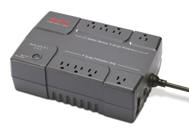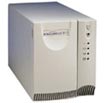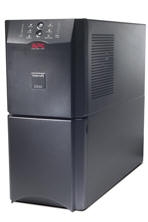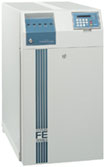RIKLBLOG
|
| Tomorrow |
| 08 Sept. 2006 |
| Yesterday |
| Index |
| Eventide |
| SETI League |
| PriUPS Project |
| Bonus! |
| Contact |
Getting SeriUPS
Today it's "attempted conservation of text" in reverse. A number of people who have read about my PriUPS project have inquired about locating an appropriate high-power UPS. The answer, as almost-always, is eBay. EBay has a "guides" feature in which users get to donate their expertise to the eBay "community." While I am a member of that community, and have no objection to donating expertise, sometimes eBay acts in a self-defeating way. I carefully wrote a "guide" about how to purchase a UPS and get a fantastic deal on it. But I didn't use eBay's "editing tool" to do it, and there seems to be no way to transfer what I wrote to eBay other than retyping the whole thing. I haven't found it necessary (yet) to point out to them that I only look stupid, but in the interim, their loss is my blog's gain, albeit a somewhat tedious and technical one.
If you already have a UPS for your computer, you probably need a bigger one anyway. If you don't have a UPS you really need to get one—you're not getting this blog by post! Without further apology, my candidate eBay UPS "guide."
Buying and Selling Uninterruptible Power Supplies
The Uninterruptible Power Supply (UPS) is a funny beast. It's a combination of two interlinked components:
-
The UPS itself is often light, potentially very expensive, and electrically robust.
-
The UPS battery, on the other hand, is very heavy, relative inexpensive, and guaranteed to die in a few years.
-
Either one, without the other, is about as useful as one tube of epoxy.
For a number of reasons, the UPS category on eBay is one replete with opportunity to get an incredibly good deal for the buyer. Why is that? Once a UPS battery has died the owner has a problem. He can either buy a new battery, which can be a bit of a hassle, or replace the UPS with a newer and/or more powerful one. The latter is often easier and frequently necessary, as his computer has developed the usual excrescences that require additional power. At this point, the old UPS is worthless to its owner, and he suddenly gets that eBay look in his eyes.
UPS Categories
| Small UPS <500W | 500 to 1500W | 1.5 - 3kW | Industrial |
 |
 |
 |
 |
I'm going to divide them into categories based on power. (They are normally specified for both power in watts or kilowatts, and for "VA" or Volt-Amperes. VA is usually a larger number and looks better in a specification.) In general, your equipment requires watts to operate, so when deciding what you need, be sure to add the watts of the equipment "load" and make sure it's less than the rating of the UPS. Somewhat arbitrarily, I divide the categories thus:
-
Less than 500 Watts. If you are anywhere near a computer store, I shall make the heretical suggestion that you consider buying such a unit there rather than using eBay. They are mass-produced and shipped on pallets, and are remarkably inexpensive. I bought a brand new 250W UPS for $10 (after rebate). Even if you get one for $.01 on eBay, it may cost more to ship it than to pick up a new one at a store.
-
500W to 1.4kW. We have now entered eBay territory! These are often units that you can get for under $10, albeit with batteries in uncertain condition. Find one with the features you want and grab it.
-
1.5kW to 3kW. At 1.5kW and above buyers can find fantastic bargains. Literally every day you can find "obsolete" but perfectly serviceable computer room "server" supplies that cost well over a kilobuck for pennies on the dollar. In particular, buyers with enough electrical savvy to be able to use a 230V UPS can get them for even less. I've personally purchased a number of multi-kilobuck 2700W units for well under $100. I use one to provide backup power for my moonbounce beacon and another I carry around in the back of my Prius to provide power on the road.
-
More than 3kW. We are now talking about "industrial" units - those that power factory equipment, computer rooms, and the like. Again, you can find fantastic bargains on these because—let's be honest—there isn't much of a demand for them. I got a 12KW unit that I use to power the house for $500, and that included good batteries. These units sell new for $10,000 and more, but they are highly specialized. If you have some flexibility in how you install and wire it, you can do remarkably well.
Getting The Most From Selling your UPS on eBay
Painted appropriately, a UPS you are no longer using makes a festive doorstop. A UPS with dead batteries makes a doorstep so effective that you may need help to close the door. No matter how eager you are to just get rid of your unused UPS, you should make some sort of effort to determine the condition of the battery and provide that in the listing. Why? Honesty, and the chance to make a few extra bucks. How? Easy:
First, look at the battery pack. Most batteries will have a date stamped or a date label stuck on them. Disclose the age of the battery pack in your eBay listing.
Next, plug in the UPS and let the batteries charge overnight. Try to find a "load" that is around 1/4 to 1/2 the rating of the UPS. This can be something as simple as a shop light for a very small one, or a "space heater" for a large one. Pull the AC plug on the UPS and note if and for how long the load continues to operate before the UPS beeps and shuts down. (If it shuts down almost instantly, or if the batteries are more than five years old, dump 'em!)
Giving the buyer this information will tell him how good the batteries are, which may make the unit more desirable, or that the batteries are bad, in which case shipping costs can be saved by discarding them.
Finally, take a good photograph of the REAR of the UPS, making sure the manufacturer's label is legible, and that all the connectors are clearly visible. Many manufacturers make a range of UPS units, and you often can't tell from the front of the unit just which model it is.
When you list the UPS on eBay, include this information and indicate that you are willing to ship the unit without batteries for a lower cost (if, of course, you are). Since shipping is a large portion of the cost of any UPS, your willingness to remove the batteries should encourage the buyer to offer a higher bid. If the batteries are unequivocally bad, you should simply list the unit as "without batteries" and show a commensurate shipping charge.
If you do remove the batteries, be sure to keep the battery connector hardware and plastic container, if any, with the UPS. The weight is negligible, and they are valuable to the buyer.
Buying the UPS You Need on EBay
If you are in the market for a substantial UPS, you are going to get an incredible bargain on eBay! (As I explained earlier, it might make more sense to get a small (under 500W) UPS locally if you have that option.) Although I've gone into quite a bit of detail about selling a UPS, from small to "industrial sized," I'm going to only consider the second of my "categories," above, in terms of buying in this guide. This covers units in the range from 500W to under 1.5kW. This is the range that normally is used for home computer setups and for running small appliances/entertainment equipment. When you get the higher power categories there are more considerations, and I will discuss those in future "guides." Here are a number of rules and potential "gotchas."
Determine your Wattage! Your UPS must be capable of delivering at least that much power, or it won't work as a UPS at all. Far better, pick a UPS capable of delivering twice the wattage or more. A UPS that will run for 3 minutes at rated wattage might well run for 10 minutes at 50% power due to battery characteristics.
Watch for "Gotchas" ! Make sure the UPS is rated for use in your location! A small number of 100V or 230V units come up for sale, and you should make sure you're not buying one unless that's what you want.
Check the specifications and the rear panel photo! If you feel that you need extras, such as USB communication with your computer, surge protection for a modem, etc., make sure the unit has them. In many cases this won't matter; but you might be special.
Remember the Batteries! Remember the doorstop theory. If you want to get a UPS with almost new batteries, be sure the seller gives you some assurance. If you can get batteries locally, you can be sure they're new, and you will save a lot on shipping.
Don't Agonize! If you search in the eBay Computers and Networking category for UPS and then go to completed items, you may be embarrassed to find just how inexpensive these units sometimes are. Unless you're having a UPS emergency, be patient and you'll get a unit for so little that it may make real doorstops look expensive!
Don't Have a UPS Yet?
I can't emphasize enough how important power reliability is. In fact, I'm so enthusiastic about having power that I have spent the last year working on a project to allow my Prius hybrid car to power my house. I'll be adding a number of guides related to this project, including info on buying bigger UPS units, buying monitoring instruments, finding the appropriate wiring, and other aspects of the project. Perhaps I'll even "review" some voltmeters!
| © 2006 |
| Richard Factor |